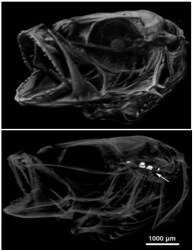Ocean acidification as a hearing aid for fish?

Ocean acidification, which occurs as CO2 is absorbed by the world's oceans, is known to negatively impact a wide variety of marine animals ranging from massive corals to microscopic plankton. However, there is much less information about how fish may be impacted by acidification, should carbon emissions continue to rise as a result of human activities.
In a new study published in the Proceedings of the National Academy of Sciences, University of Miami (UM) Rosenstiel School of Marine & Atmospheric Science researcher Sean Bignami, along with National Oceanic and Atmospheric Administration (NOAA) scientists Ian Enochs, Derek Manzello, and UM Professors Su Sponaugle and Robert Cowen, report stunning new insight into the potential effects of acidification on the sensory function of larval cobia (Rachycentron canandum). Cobia are large tropical fish that are highly mobile as they mature and are popular among recreational anglers.
Bignami and the team utilized 3D X-rays (micro-CT scans) similar to what a patient might receive at a hospital to determine that fish raised in low-pH seawater, simulating future conditions, have larger and more dense otoliths (ear stones) than those from higher-pH seawater. Otoliths are distinct calcium carbonate structures within the inner ear of fishes that are used for hearing and balance. The changes resulted in up to a 58-percent increase in otolith mass, and when tested in a mathematical model of otolith function, showed a potential increase in hearing sensitivity and up to a 50-percent increase in hearing range.
"Increased hearing sensitivity could improve a fish's ability to use sound for navigation, predator avoidance, and communication. However, it could also increase their sensitivity to common background noises, which may disrupt the detection of more useful auditory information," said Bignami, who recently completed his PhD in Marine Biology and Fisheries at UM.
The study, a collaboration between UM and NOAA's Ocean Acidification Program at the Atlantic Oceanographic and Meteorological Laboratory in Miami, is the first to use micro-CT technology to examine otoliths while still inside the heads of the larval fish.
"This effect of ocean acidification represents a significant change to a key sensory system in fish. Although the ultimate ecological consequences still need to be determined, there is the potential for serious impact on important processes such as larval fish recruitment and fisheries replenishment in this species and perhaps other critical fisheries," Bignami added.
More information: Bignami S, Enochs I, Manzello D, Sponaugle S, Cowen RK (2013) Ocean acidification alters the otoliths of a pan-tropical fish species with implications for sensory function. Proceedings of the National Academy of Sciences. doi:10.1073/pnas.1301365110
Journal information: Proceedings of the National Academy of Sciences
Provided by University of Miami













.jpg)





